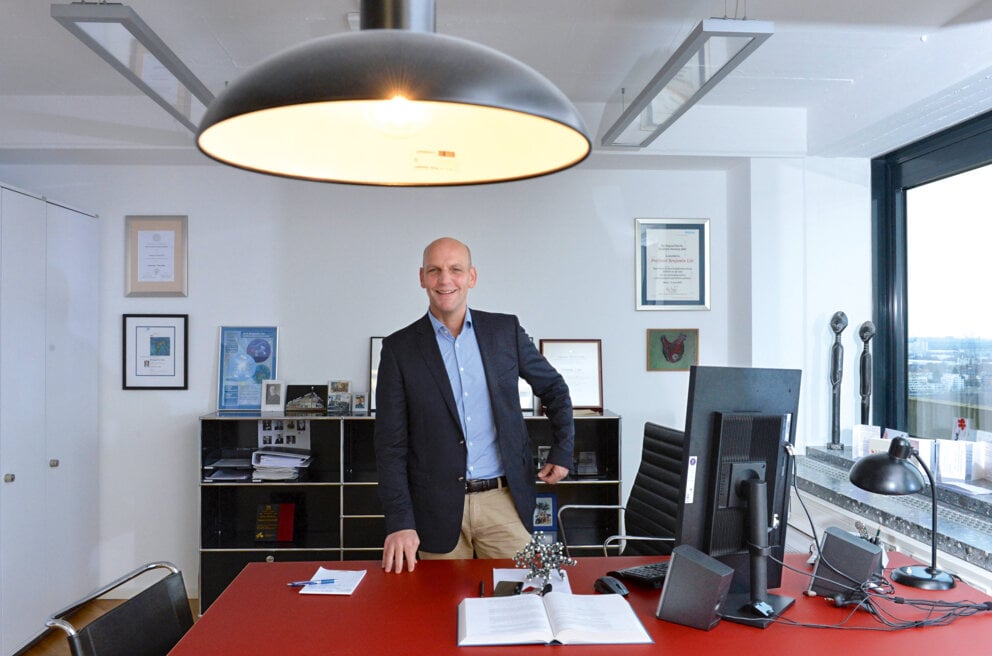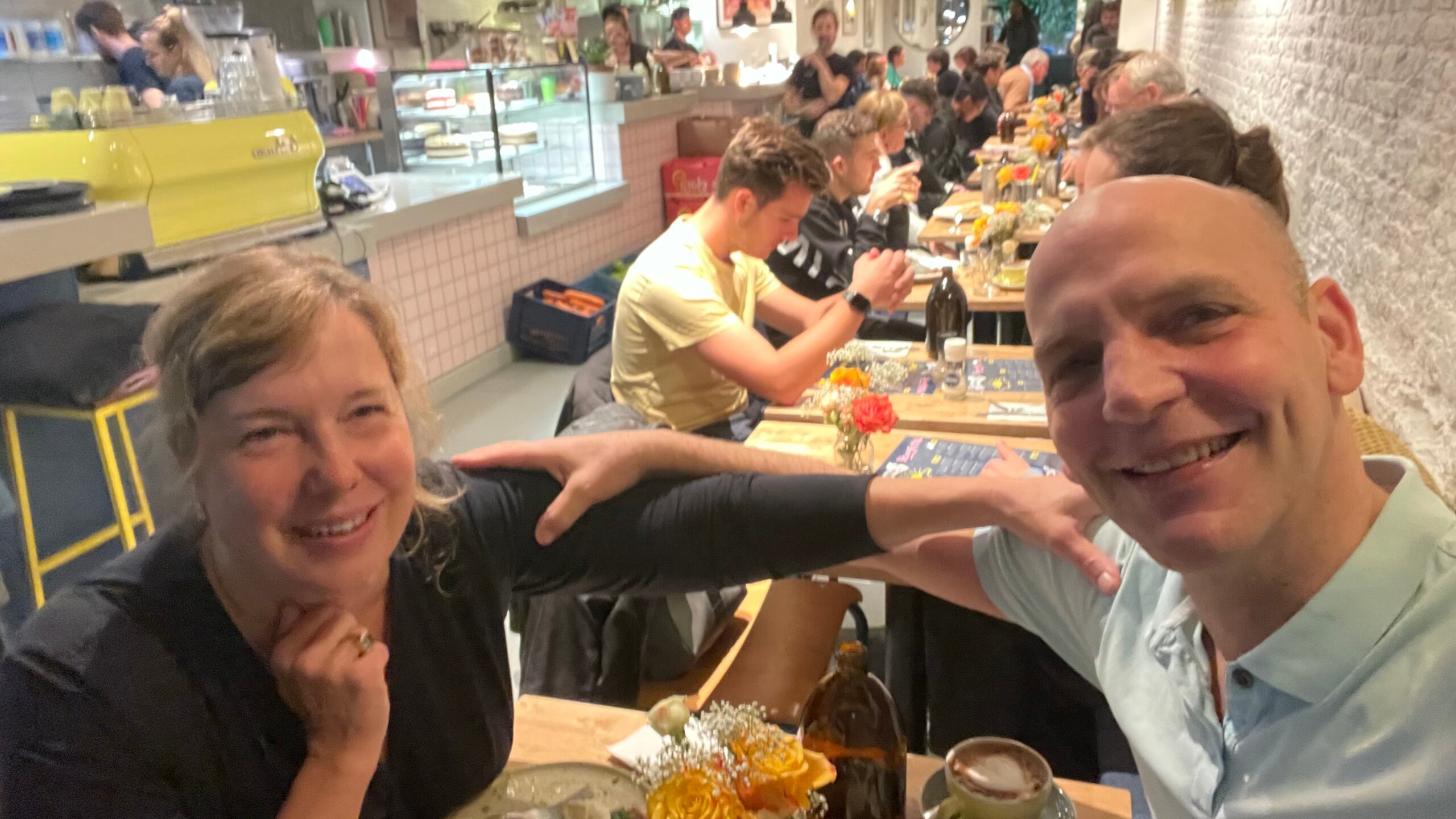Benjamin List
Interview
Interview, January 2024
“Trust your own intuition and ideas”
If you had the chance to meet a Nobel Prize laureate, what would you ask? On 23 January 2024, Benjamin List was joined by ten students from all over the world and from different disciplines within science for a conversation on the topic of being a scientist. Professor List gave his best advice for maintaining a science career, spoke about green chemistry and shared his definition of happiness.
The conversation was moderated by Carin Klaesson, curator at the Nobel Prize Museum in Stockholm.
Supported by Nobel International Partners, 3M, ABB, Capgemini, EQT, H2 Green Steel and Scania.
Interview with Benjamin List, February 2022

Benjamin List at his office .
Photographer: David Ausserhofer
Photographer: David Ausserhofer
“We need to represent the whole diversity of all humans in science”
On 8 February 2022, nobelprize.org spoke to Benjamin List on the meaning of life and how important diversity is in science. He also told us about one of the most beautiful moments in his life – the moment he arrived at his university after finding out he had been awarded the Nobel Prize in Chemistry.
Nobel Minds
Five of the 2021 Nobel Prize laureates met digitally on 4 December 2021 for the traditional round-table discussion and TV program ‘Nobel Minds’ hosted by the BBC’s Zeinab Badawi. The laureates discussed their research, discoveries and achievements and how these might find a practical application.
Participants: Klaus Hasselmann (physics), Benjamin List (chemistry), Ardem Patapoutian (medicine), Abdulrazak Gurnah (literature) and David Card (economic sciences).
Telephone interview, October 2021
“What it takes to be creative is freedom”
Telephone interview with Benjamin List following the announcement of the 2021 Nobel Prize in Chemistry on 6 October 2021. The interviewer is Adam Smith, Chief Scientific Officer of Nobel Prize Outreach.
Benjamin List was sitting in a café with his wife, Dr Sabine List, when the call from Stockholm came. “We looked at each other in disbelief,” he says, and jokingly asked, “Is this the call?” To his amazement, it was! In this interview, recorded outside that café, he reflects on the beauty of building molecules, the importance of freedom in research and the joy of working with his team: “To work with these amazing, happy and creative people; it’s such a gift.”
Interview transcript
Adam Smith: Hello, may I speak with Benjamin List please?
Benjamin List: Yes, he’s on the line.
AS: Thank you very much indeed. My name is Adam Smith, calling from Nobelprize.org, the website of the Nobel Prize.
BL: Yes.
AS: Many congratulations on the award.
BL: Thank you so much, I’m really happy and honoured. Wow.
AS: Tell me how you heard the news.
BL: I was sitting in the café with my wife. We were about to have breakfast. And then the phone came and on the display it said Sweden and we looked at each other in disbelief, like jokingly, ‘is this the call?’ you know. I went outside, and it was the call. So that was really … I don’t know, it was like a dream.
AS: Of course. Were you able to compose yourself for the call?
BL: I had to deeply breathe in and out, and then I felt like I had to feel composed enough at least.
AS: But how lovely to be with the family when you get the call. That’s special.
BL: Exactly. It was so beautiful, just my wife and I sitting in a café, and she’s been there all those years, from the end of my PhD until today. She was there when the discovery was made, and she supported me over all those years, and it’s great to actually get the call when she is around.
AS: How lovely that you can share it, and what a pity you can’t just sit there and savour the moment together quietly rather than be phoned by annoying people!
BL: Yes, that would be great! Yes. No, I’m happy to… I mean, I know that comes with this award, I’m happy to fulfil my duty. Because I consider it a duty also, right? I mean, this is kind of a …
AS: Thank you. Yes, I remember Orhan Pamuk saying ‘Yes, I understand I have to do my homework now’.
BL: [Laughs] I am completely unprepared.
AS: There will be much focus on the myriad applications of the technique, but, I mean, you’re an organic chemist, and the joy is making molecules. Can you say something about that particular pleasure, in just building new things?
BL: Yes, I love … It’s difficult to explain to people who are not chemists, and specially not synthetic chemists, because we really think, and maybe it’s naive or weird, but we really think our molecules have a certain beauty to them. And then, making them is like creating something beautiful, especially if they’re natural products. Somehow natural products have a particular beauty often, but also like if you make a certain drug molecule that saves lives, I think it’s beautiful to do this. We as chemists, we’re often people who are responsible for plastic waste, or other, or glyphosate – I’ve nothing against glyphosate, just people don’t realise how much, how many great gifts this can provide to our lives, right? I guess. It’s making molecules, and making them … And then there’s another aspect. It’s not just the molecules that are beautiful but also the way to making them, how you make them, and there can be huge differences, like some processes require toxic reagents and produce waste and use a lot of energy. But if you do it elegantly and you don’t need … Like we have this great term that my colleague Barry Trost of Stanford University has coined, it’s called atom economy, when we make molecules from other molecules and all the atoms of these other molecules are still preserved in your product – that’s called atom economy. Like, perfect atom economy, and that’s for me a perfect and beautiful chemical reaction. Honestly it’s just a joy, and I would argue most chemists do this because they love it and enjoy it.
AS: Thank you so much for taking just a minute to talk about the beauty of the science. I think it’s special that people should understand that. That’s lovely.
BL: Yes.
AS: We don’t have long, but one last question. What is it that you think is special about your research environment, that you created, that allows you to be so creative, so innovative?
BL: Now is a good moment to thank my host institution, and that’s the Max Planck Society of course. Because, like the Max Planck Society, I also believe that what it takes to be creative is freedom. And sort of the trust by your funding agencies. They think, ‘this scientist has great ideas let’s give him the space and the resources to fulfil his dreams’. And this is totally also my philosophy, and that’s what I try to, in a small way in my department, try to recreate this freedom. I hope my graduate students will not be opposed to what I’m going to say, but I think I’m not a slave driver, and I’m not saying ‘work harder, work harder, work day and night’ – it’s not my philosophy. I also encourage them to think, and to enjoy life, and for example whenever we have something to celebrate, we celebrate it. Even if we, occasionally we may not have something to celebrate, we still do it. I would like to … When somebody has a nice little discovery, then we have a little party in our seminar room. And I think the people that have joined me over the years, they are in line with this spirit. Recently we had our international dinner last week, where my group of course is composed of many different nationalities, and each of them brought a special food from his or her own country, and there was this moment we tried all the food and everybody gave a little speech about the style of his country, and this internationalism and respect for each other, this diversity … and there was this moment, I was among my graduate students, I had goosebumps on my head because I was enjoying this so much, to work with these amazing, happy and creative people, it’s such a gift already, and that’s my sort of philosophy about freedom in science and how creativity is formed.
AS: Thank you so much. In this brief call we’ve talked about family, beauty, dreams, friendships, society, what an advertisement for science!
BL: [Laughs] That’s true. It may be a bit unexpected, but I come from a family of artists and scientists, and so we always have sort of both sides in my family.
AS: Lovely. I hope we’ll have the chance to talk more, but for now that’s fantastic, thank you very much indeed and congratulations.
BL: Wonderful, thank you very much, Adam. Pleasure to talk to you.
AS: Bye.
BL: Bye

Prof. Dr. Benjamin List with his wife Dr. Sabine List 60 seconds after the call from the Royal Swedish Academy of Sciences telling him the news about being awarded the 2021 Nobel Prize in Chemistry, 6 October 2021.
Selfie by Benjamin List
Selfie by Benjamin List
Did you find any typos in this text? We would appreciate your assistance in identifying any errors and to let us know. Thank you for taking the time to report the errors by sending us an e-mail.
Nobel Prizes and laureates
See them all presented here.
